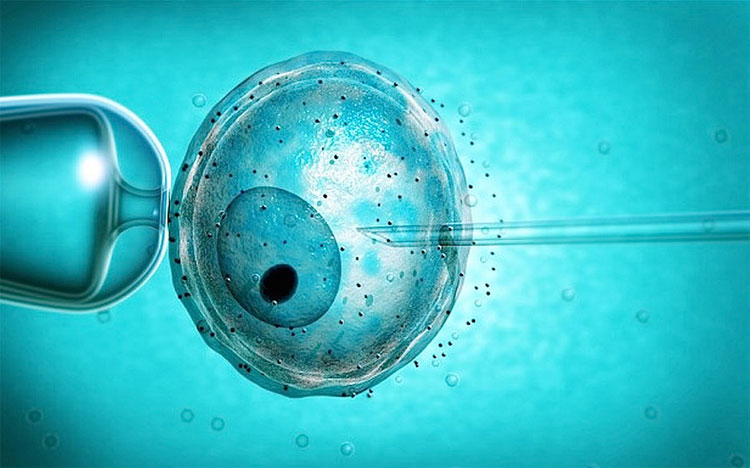Boys born from test tubes have a high risk of infertility
A new study has shown that boys born by in vitro fertilization have low sperm count and may not be able to have children later in the natural method.
Doctors in Brussels pioneered the injection of oocysts or ISCS (Intra-cytoplasmic Sperm Injection) in the 1990s and 54 children were then born with this method.
This technique was developed to help infertile men choose the healthiest sperm and then inject it into the egg before implantation of the embryo formed into the mother's body. Today, this method also applies to infertile women because the best sperm selection increases the chance for healthy babies.
However, experts are concerned that at the time these boys are born from this technology will also inherit the father's infertility , which means that future generations will always need ICSI if They hope to become parents.

The ICSI technique involves selecting healthy sperm and injecting it into oocytes.(Source: Sarah Knapton, science editor).
In the first study, the team found that 54 men aged between 18 and 22 years of age mostly had sperm concentration of half of men born by natural conception, of which 62 Lower sperm count when semen analysis and 66% lower in motile sperm count - a method to identify healthy sperm that can move.
These men also had lower sperm counts than were considered normal by the World Health Organization (WHO) four times.
Professor André Van Steirteghem, head of the Reproductive Medicine Center at Vrije Brussel University (VUB), Brussels, Belgium, where the technique has been developed says "These findings are not unexpected. ".
Steirteghem added: "Before performing the cytoplasmic spermatozoa (ICSI) injection, prospective parents have been told that their boys may have reduced sperm and semen. as their father ".
For parents, this information is not a reason to avoid ICSI because they said, "If this happens, ICSI can then be a solution for our boys . " The first results from the male group born from the ICSI method around the world have shown that there is a degree of "reduced fertility" actually transmitted to children from the father who has gone through. ICSI due to declining reproductive characteristics.
The first child was born from ICSI method on January 14, 1992 and all men in this study were born in the early years of this technique, from 1992 to 1994. Researchers Research also corrects their results for factors that can affect semen quality such as age, body mass index (BMI) and sexual malformations.

Boys born of ICSI technology may need to be treated with infertility.(source: ALAMY).
There are about half of the 60,000 annual fertility treatments in the UK involving ICSI techniques and it is often used when the cause of infertility is unknown.
Professor Allan Pacey, Professor Andrology at Sheffield University shared: "When the ICSI method was first introduced into clinical practice, there were many discussions and debates about future fertility prospects. When boys are born from this technique and when they reach adulthood, this is extremely grounded by the reason for using ICSI technology to conceive as a father of fine quality. poor coincidence, which is almost genetic. "
"So if these genes are inherited by any boy born from the ICSI method, they seem to have the same level of infertility as the father and must use ICSI when they want to become a person. future father ".
Professor Simon Fishel, CEO of CARE Reproductive Center, added: "We still encounter men born from ICSI technology who are able to conceive naturally. Only parameters are needed. Their semen is not evidence of the need for ICSI or IVF techniques, we know that many such men are still capable of conceiving naturally and will need more research to determine clearly. more results of this study ".
The study was published in full in Human Reproduction.
- IVF has a high risk of disease
- What's the difference between a test-tube baby?
- Born from test tubes, health is affected?
- IVF fertilization is easy to give birth to a son
- The first baby was born in test tubes - that day, now
- Close up of the first two baby lions in the world were born in test tubes
- The twins were born from father's immobile sperm
- 18 babies were born from a three-gene transplant test
- For the first time in Vietnam, there are new techniques to cure infertility that ...
- Fatty slows puberty in boys
- People are at risk of extinction because of the risk of infertility increases by 60%.
- Men are about to cure infertility by an extremely simple method
 Green tea cleans teeth better than mouthwash?
Green tea cleans teeth better than mouthwash? Death kiss: This is why you should not let anyone kiss your baby's lips
Death kiss: This is why you should not let anyone kiss your baby's lips What is salmonellosis?
What is salmonellosis? Caution should be exercised when using aloe vera through eating and drinking
Caution should be exercised when using aloe vera through eating and drinking